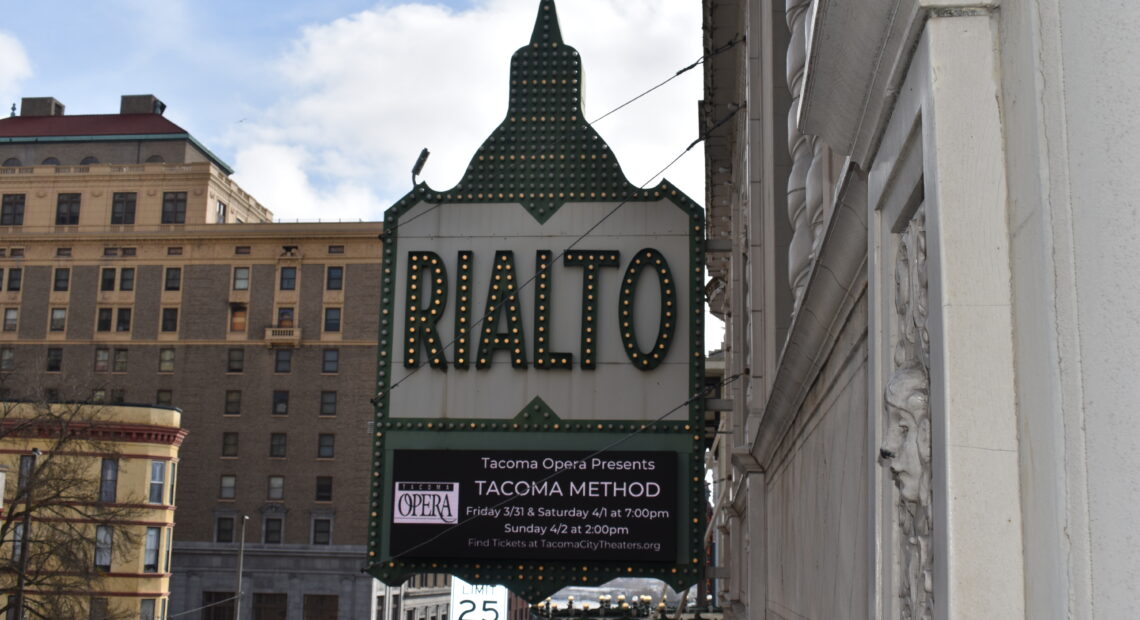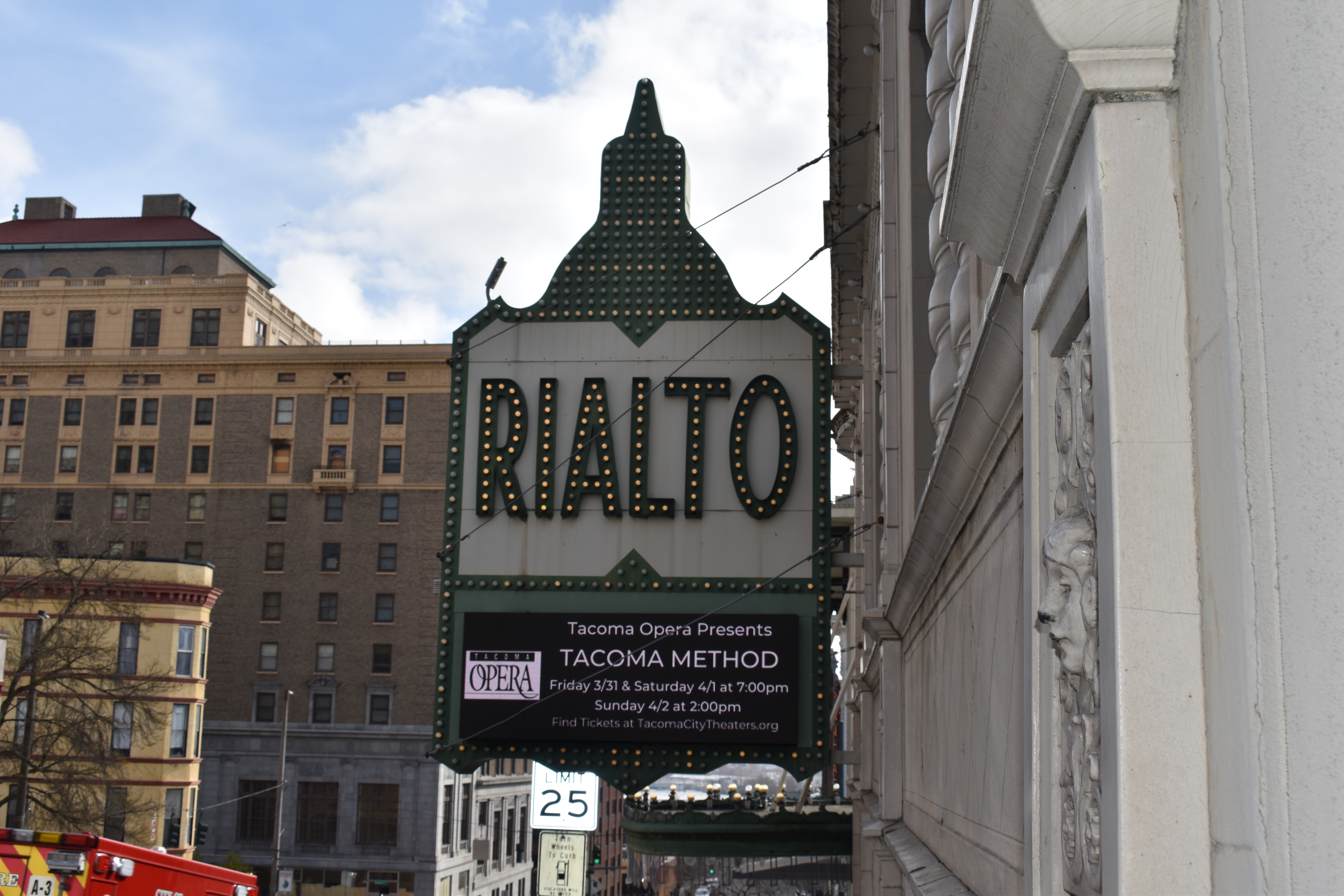
Tacoma Method Opera tells history from a new perspective
Listen
(Runtime 3:54)
Read
That history tends to repeat itself, especially when people don’t learn lessons from the past, is the guiding sentiment for Teresa Pan-Hosley in her work as the president of the Chinese Reconciliation Project Foundation. This organization is solely dedicated to reconciling the dark history of the Chinese expulsion from Tacoma in 1885.
“For me personally, it is imperative for me to take on this and to tell the story of the events of 1885. I want to share the information with our community and to make sure this tragic event will not happen to anybody in our community — in any community in our city,” said Pan-Hosley at a discussion with historians, professors and arts leaders in February about the incident.
Now that history is being retold on the stage. Tacoma Opera is premiering a production Friday that presents the tale of the Chinese expulsion in operatic-dramatics and centers the narrative on the oft-excluded Chinese perspective.
Retelling history, connecting it to the present
When Zhang Er, the librettist of the opera, began her research for the production, she couldn’t find archival information from the perspective of Chinese people impacted by this horrific event.
“I found lots of materials about what happened, actually, from the Western settlers’ perspective,” Er said. “Local newspapers have articles or advertisements about the political movement of ‘Chinese Must Go’ … that’s the slogan advertised everywhere.”
That lack of perspective certainly doesn’t come from a lack of people impacted. At the time of the expulsion, about 700 people of Chinese descent were living in Pierce County — 10% of the entire population.
On Nov. 3, 1885, leaders of the city, including the mayor and police chief, along with everyday citizens, drove 200 Chinese people out of their homes, burning the Chinese part of the city to the ground, according to the Chinese Reconciliation Project Foundation. The incident became heralded as the “Tacoma Method,” to rid communities of Chinese people during a time of anti-Chinese sentiment nationwide.
The creators have reclaimed “Tacoma Method” as the title of their opera.
To ensure historical accuracy and a retelling that imagined the perspective of Chinese families impacted, Er found one original document of an affidavit filed years after the expulsion by some who were affected in a case against some of the rioters.
“That was the primary source to kind of glean from that to try to reimagine the lost community.” Er said.
In addition, Er gleaned cultural information from the Chinatowns in Portland, Ore., and San Francisco. These pieces allowed her to paint a picture of a vibrant immigrant community in the opera. Er noted how she had to piece together the narrative despite the lack of cultural resources in the city today. Tacoma still doesn’t have a Chinatown. There isn’t a cultural center for Chinese people in the city, she said.
The opera is only one of many responses from Tacoma to this dark incident, said Gregory Youtz, composer of the opera.
This year marks 150 years since the Northern Pacific Railway came to Tacoma. That railroad wouldn’t exist without the Chinese laborers who built it. As the Northern Pacific Railway was being laid, there was a labor strike. So the company hired Chinese workers to complete the railroad. They settled in communities along the West Coast.
The Tacoma Historical Society recognized this and created an exhibit entitled “Dreams and Disposition,” to remember the wealth and success, as well as sadness and terror that affected the Chinese community.
At February’s panel discussion commemorating the incident, Doug Andreassen, vice president of the Tacoma Historical Society, explained how the story of the railroad is one deeply tied to the Chinese community. When the anti-Chinese sentiment built up and resulted in the expulsion of the Chinese from Tacoma, Andreassen said Northern Pacific had a chance to speak up and stop it.
“The Northern Pacific said nothing at the time,” Andreassen said.
The Tacoma Method is just one example of anti-Chinese action that took place nationally. In 1882, Congress passed the Chinese Expulsion Act, which put a 10-year ban on Chinese laborers immigrating to the United States.
Some people continue to live with this pain, Andreassen said. A mother of a friend of his, who is in her 90s, won’t come back to Tacoma because her family was one of the families expelled from the city.
“We think of this as being a long time away in history,” Andreassen said. “It isn’t.”
Creating an opera to commemorate history
Er began creating this opera 10 years ago, and Youtz joined her to write the music after five years.
For his creative process, Youtz said, “ I realized from the very beginning that I was going to have to somehow evoke two cultures, the Chinese culture and the Western culture.”
The first half of the opera employs Chinese musical material.
“The opera opens on Chinese New Year, early morning, family waiting for the sunrise,” Youtz said. “There are a lot of lion or dragon dancers, which means lots of percussion, cymbals, gongs, drums, etc.”
Er said they chose to start with this important celebration in the Chinese community to show how the Chinese made up a vibrant part of society in Tacoma during this time. Er said she also wanted to establish the commonalities between Chinese and Western settlers coming to the area for work and establishing families and communities in the hope of a prosperous future.
Youtz evoked this narrative in the music.
“There’s a scene where some kids, both Western kids and Chinese kids, who are too young to be caught up in politics or racial hatred, they just find each other’s music interesting. So they play music together,” Youtz said. “And that’s kind of the opposite of what the adults in the story are doing.”
Er said opera is the perfect storytelling medium.
“I think there is no other art form that would give the unmediated human voice such room to display itself,” Er said.
The live and all-embracing nature of opera as a way to tell a story and connect with audiences was too powerful for Er and Youtz not to tap into to tell this story.
“One of the things I hope that comes out of this is not just that more education and consciousness raising about immigrants and immigrant cultures and things but also just consciousness raising about opera and how amazing live opera is,” Youtz said.
For the creators, it’s a way to express a complicated history and a powerful message through art.
“This is not just a production by Tacoma Opera, this is the city talking to itself about its own history,” Youtz said.
















